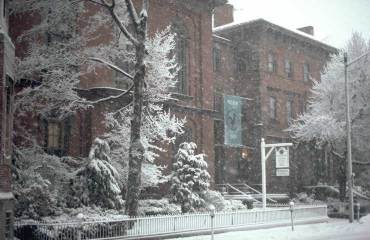Extreme Weather
- Home
- About Salem »
- Salem Tales »
- Extreme Weather
Extreme Weather
The pages of Reverend Joseph Felt’s Annals of Salem, a two volume collection of historical facts about the town that was published in 1827 and 1828, are filled with fascinating tidbits about weather extremes and other oddities in Salem’s history.
In July 1773 lightning struck a tree on Gallows Hill and rendered it the shape of a broom. In 1798 another bolt hit the ship Martha in Salem Harbor, killing two sailors and wounding two others.
Salem experienced a violent hailstorm on August 1, 1815. Some hailstones were five inches in circumference. The storm lasted but a few minutes but broke thirty thousand panes of glass in Salem alone. Every house in the town lost at least one pane. A similar storm in 1819 destroyed 168 panes of glass in a single home on Essex Street. Felt notes: “Human power quailed before its violence.”
Snowstorms in 1829 and 1978 dumped at least two feet of the white stuff on Salem in a single day. And in what had been a normal July in 1804, snow fell one day in Salem and surrounding towns.

View of the Phillips Library, Essex Street, during a snowfall
Salem has experienced hurricanes, blizzards, earthquakes, eclipses, and many other natural phenomena. But to local townspeople nothing was as frightening as the “great darkness” that fell over the town on May 19, 1780.
According to an entry in the diary of William Pyncheon, the darkness began descending over the town at ten in the morning on that normal, bright day. Over the next two hours the sky grew increasingly dark, and by noon people were eating and reading by candlelight. Confused cocks crowed, and a general melancholy fell over the townspeople — except the sailors, who went “halloing” through the streets and taunting the young ladies they encountered to divest themselves of some of their clothing.
Members of Dr. Nathaniel Whitaker’s church gathered for solace at their meeting house on School Street, now Washington Street. Instead they were rebuked by their pastor, who claimed the darkness was a punishment sent from the Lord for past transgressions.
The darkness, incidentally, was caused by the smoke from wildfires in northern New England.
Jim McAllister
All rights reserved

